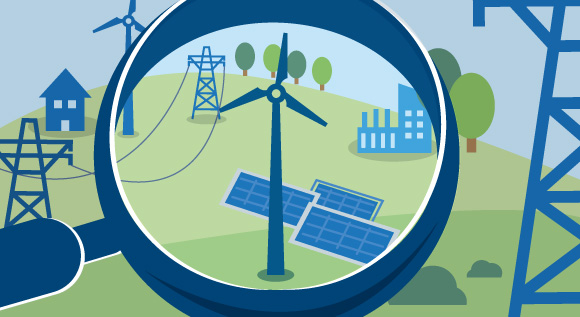What actually is the Federation-Länder cooperation committee?
The Onshore Wind Act announced by Minister Habeck for 2022 is to result in sufficient sites for wind energy in Germany. This issue is currently the subject of intensive discussions in the Federation-Länder cooperation committee.
 © BMWK
© BMWK
“We will use the Onshore Wind Power Act to reserve two per cent of Germany’s land territory for wind energy,” announced Minister Habeck in his press conference on Germany’s current climate action status in mid-January. In order to achieve this, the Federal Government intends to work closely together with the Länder and municipalities. Amongst other things, the coalition agreement proposes a strengthening of the Federation-Länder cooperation committee. But what actually is this body?
Who talks to whom on the cooperation committee?
It is the job of the committee to monitor the expansion targets of the Länder for renewable energy and their implementation status, with a particular focus on onshore wind. The body comprises the Federal Ministry for Economic Affairs and Climate Action, all 16 Länder, the federal ministries for the environment, agriculture, transport, finance and building, and the Federal Chancellery. The members of the committee at state secretary level convene at least twice a year to discuss the status of the renewables rollout. Their work is based on the reports from the Länder and comprehensive monitoring of the progress.
The Onshore Wind Act is to stipulate that each of the Länder must provide two per cent of its area for wind turbines. Existing barriers to the expansion of offshore wind are to be cleared away. In addition to freeing up more sites in order to meet the two per cent target, the act also aims in particular to speed up and simplify planning and approval procedures. Here, the expansion of wind energy and the protection of endangered species must go hand in hand. The planned revision of the Renewable Energy Sources Act also aims to reduce the distances between wind turbines and weather radar stations as well as omnidirectional radio beacons for air traffic. The latest meeting of the Federation and the Länder in the cooperation committee was on 16 February, when there was an intensive debate about the implementation of the two per cent target and possible options for the breakdown of the target between the Länder. The meeting was chaired by the new chairman and state secretary in the Federal Ministry for Economic Affairs and Climate Action, Patrick Graichen.

